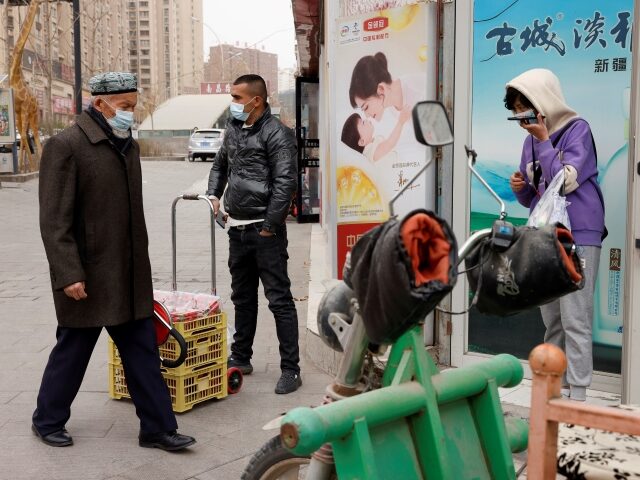Radio Free Asia (RFA) reported on Wednesday that at least 22 people died from starvation or lack of medical attention in a single day under China’s brutal coronavirus lockdown in Ghulja, a city in the Uyghur region of East Turkistan.
RFA investigated the Ghulja deaths because Uyghurs trapped in coronavirus lockdowns have been begging for help on social media, their pleas noted and boosted by Uyghurs living abroad.
As RFA pointed out, these are not the first accounts of starvation since Ghulja went under lockdown early last month, but the situation has grown desperate enough for the oppressed Uyghurs to risk severe punishment by demonstrating in the streets and posting videos online:
Last week, more than 600 mostly young Uyghurs from a village in Ghulja were detained by authorities in Xinjiang after they ignored a strict COVID-19 lockdown and staged a peaceful street protest against a lack of food that had led to starvation and deaths.
Videos posted by desperate Uyghurs on Chinese social media platforms—and quickly deleted by government censors—show local people under strict “zero-COVID” lockdowns struggling to access food and medical care, with some saying family members had starved to death.
When RFA followed up on reports of 22 deaths in Ghulja on September 15 alone, two unnamed public officials told the outlet it was true, while a third gruffly insisted there were only 20 fatalities.
“There are 20 people who have died of starvation. Don’t call again,” said the irascible Ghulja municipal official.
Some of these local officials were apparently willing to cop to 20-22 deaths because they wanted to refute claims on social media that up to a hundred residents died from deprivation on that single day.
Uyghurs in Ghulja said there were charged outrageous fees for food deliveries, while donations of food from outsiders were brusquely refused. Family members of the deceased confirmed that some were survivors of China’s infamous concentration camps.
RFA spotted a message in the Uyghur language posted on Douyin, the domestic Chinese version of TikTok, ordering Ghulja residents not to upload “any news, any graphic with news written on it, or images of desperate expressions or videos on social media, especially in separate chat rooms.”
Al Jazeera last week reported on Ghujla residents posting photos of their empty refrigerators and hungry children. Some wept when they described their hardships under 40 days and counting of coronavirus lockdown.
A Uyghur student living in Europe told Al Jazeera that his parents in Ghulja were forced to survive on “uncooked dough made of flour, water and salt,” because they are forbidden to use their backyard oven under quarantine rules.
“Their voices are always in my head, saying things like I’m hungry, please help us. This is the 21st century, this is unthinkable,” the anguished student said.
Censorship of the lockdown horror in Ghulja is so tight that people have been arrested merely for talking about food shortages on the Internet. Al Jazeera reported some videos have been “deleted and reposted dozens of times as netizens battled censors online.”
Ghulja was the scene of a massacre in 1997, when troops from the Chinese People’s Liberation Army (PLA) were sent in to crush Uyghur protests. Uyghur advocates say about 1,600 unarmed residents of the city were gunned down by the PLA.
Some Uyghur groups believe the coronavirus lockdowns in what China calls the “Xinjiang Uyghur Autonomous Region,” with their suspiciously threadbare supplies of food and medicine, are another Chinese effort to thin out their population.
“We’re deeply disturbed by the photos and videos coming out of our homeland, especially from Ghulja. China’s communist government is using [Chinese coronavirus] as a pretext to lock down our people in their homes and continues its genocide. We want to bring attention to it,” Uyghur American Association President Elfidar Iltebir said this week, as quoted by RFA.

COMMENTS
Please let us know if you're having issues with commenting.